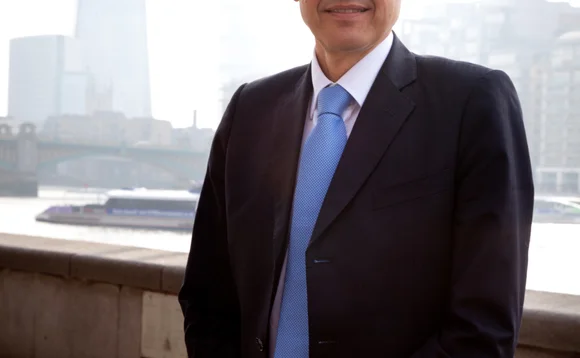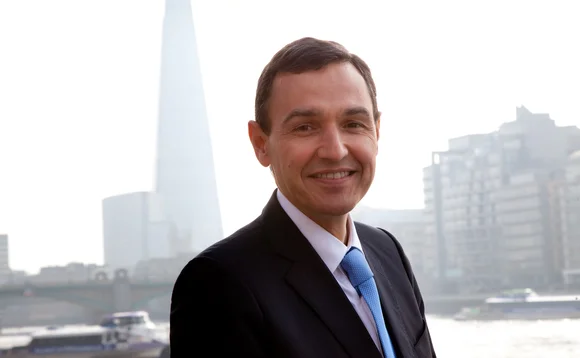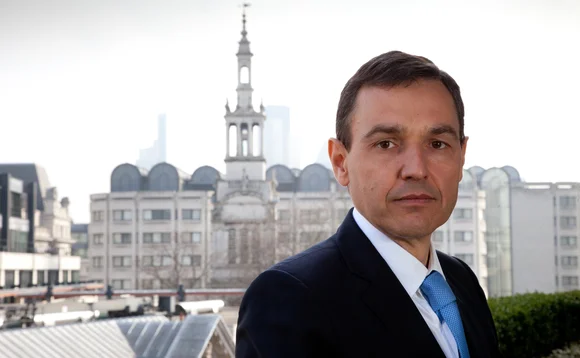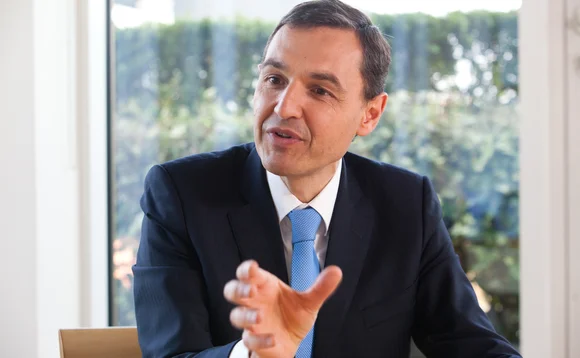Challenge Accepté: AXA Investment Managers CIO Hervé Morel-Derocle






After a dash across London from the Eurostar terminal at the St. Pancras International station, Hervé Morel-Derocle meets me at the reception of the AXA Investment Managers offices in London, and, as we shake hands, my first question arises: Which language are we going to speak—English or French? We are both French and should logically opt for our mother tongue, but we are, after all, in the heart of the City. AXA’s offices sit in the shadow of the imposing St Paul’s Cathedral, beside the iconic Millennium Bridge that leads over the Thames River to the Tate Modern, and Shakespeare’s Globe Theater is just a stone’s throw away. We exchange greetings in both languages, but after a brief interaction with French-speaking colleagues in the elevator, we agree to stick to French—at least until we broach the subject of financial technology, the jargon of which is mostly English.
We enter a nearby meeting room. This isn’t Morel-Derocle’s usual office, of course, but one borrowed for the occasional days he spends on this side of the English Channel. But, with his iPhone and iPad at hand, it feels almost like home, minus the croissants and good coffee.
A proud advocate of “anytime, anywhere, and on any device,” Morel-Derocle’s plan is to introduce more flexibility and mobility to AXA IM’s 2,100 global employees, although preceding that initiative was a significant amount of catch-up work in order to keep the firm’s infrastructure afloat and up-to-date, which is what kept him preoccupied for much of his two first years in the role.
Significant Parenthesis
Twenty-four years ago, Morel-Derocle took his first job as an IT project manager for French bank Le Crédit Lyonnais. At the time, the state-owned bank, founded in 1863 in Lyon, was booming across the world, with subsidiaries in Europe, Asia, and North and South America, before a number of political and legal debacles brought the firm close to bankruptcy in 1993. Morel-Derocle travelled the world setting up messaging services for the bank’s overseas offices, a new technology at the time.
“It was the beginning of global networks and the concept of distributed computing was still in its infancy,” he says. “Messaging services only existed in the professional world—consumers didn’t have access to messaging services at that time and we had to fly all around the globe to show people how to get into an inbox and how to send an email.”
“We wanted to be more competitive and more efficient, but we couldn’t achieve that on our own. We needed to completely restructure our IT pricing model to have a more transparent and relevant IT service. That was crucial and a big pill to swallow for our people.”
After 11 years at Le Crédit Lyonnais, Morel-Derocle joined the investment management arm of one of the world’s largest insurance groups, AXA Investment Managers, as global head of solutions delivery, managing a team of infrastructure project managers. There, he spent a decade rising through the ranks, and was offered the somewhat unusual role of chief audit executive, a position he found himself in only a few months after the collapse of Lehman Brothers and the onset of the global financial crisis. For the next three years, Morel-Derocle audited, evaluated, and risk-profiled every entity that held the investment manager together, which gave him a considerable edge when he assumed the role of CIO.
“I know all the business lines and all their needs very well since I was once in charge of the audit,” he says. “I had developed a dialogue with all the people in charge of running those businesses, and it was a great privilege and a humbling experience to be in the position of having to tell them how to improve their operational efficiency.”
What Morel-Derocle calls a “short but significant parenthesis” in his career is what makes the difference in his leadership ability. It is also what he has in common with AXA’s CEO, Henri de Castries, who also had an auditing remit—although his was on behalf of the French Treasury—before joining AXA.
Out With the Old
Morel-Derocle is candid about conditions during his early days as CIO, describing his start as stressful. “Upon taking that job, I did a quick diagnostic on the obsolescence of our hardware and infrastructure, and obtained €18.3 million ($25.5 million) to bring everything up to date over the next three years. There is a bit of a challenge when you’re appointed CIO in July 2012 and you realized that the firm’s computers around the world are running Windows XP, which Microsoft will no longer support after April 2014.”
Morel-Derocle’s résumé demonstrates a results-driven mindset, thought leadership, and a taste for innovation—important, if not essential, skills required when charged with refreshing and modernizing an infrastructure like the architecture at AXA IM when he arrived.
The firm had embarked on several costly projects that delayed the maintenance and routine upgrading of its systems until 2012. Indeed, in 2004, it decided to outsource its middle-office operations in France, Germany and the UK to State Street Corp. Two years later, AXA further outsourced the administration services of its Luxembourg and Dublin-based fund businesses, and, like other asset managers in Europe, had to absorb the burdensome regulatory costs on the back of such arrangements.
“Don’t get me wrong, as the former audit chief, I am thrilled that we put up with all the regulations—it’s no joking matter for me,” Morel-Derocle says. “But we were getting dangerously obsolescent and we really needed to look at how to upgrade our systems in the most effective way to remain efficient in the long run.”
With XP support about to expire, AXA could not afford to be sidetracked again and so it made the decision to move to Windows 7, after contemplating the leap directly to Windows 8. “Being an early adopter is not always the best idea you can have,” Morel-Derocle says. “Windows 8 would have been a great ally in terms of mobility and a great enabler for innovation, but it was a risk too great to take for something that remains a new product.”
Now that the catch-up phase is almost over, Morel-Derocle can focus on the rest of the firm’s infrastructure, starting with restructuring its technology pricing model, which will not only reduce costs and improve efficiency, but also drive more investment and avoid the pitfalls associated with last-minute upgrades. “All of that will take place on top of our usual workload,” he says.
Challenge Accepted
This year will be a crucial one for Morel-Derocle, as he embarks on the second phase of his grand plan. But his strategy could not be clearer: “Our top priority for 2014 is to restructure our aging front-office systems, and for that we will reflect to determine the best way to revamp our front office, risk, and operational businesses for more efficiency. The second objective is to expand our global presence and technology performance to support a 24/7 business model, and to come up with a sound data governance strategy to support that. But before all of that, we want to restructure our IT spending so that we have fewer fixed costs and more variables rates.”
Restructuring in his case didn’t mean just moving budget around, or singlemindedly requisitioning more funds. Morel-Derocle likes a good challenge, which means more than reallocating money for optimal efficiency. In taking a close look at the firm’s IT spending, he made an ambitious decision to reduce spending by €15 million ($20.9 million) by 2015.
“We wanted to be more competitive and more efficient, but we couldn’t achieve that on our own,” Morel-Derocle says. “We needed to completely restructure our IT pricing model to have a more transparent and relevant IT service. That was crucial and a big pill to swallow for our people.”
From the CIO’s perspective, AXA IM needed to introduce more fairness and relevance to its IT business if it wanted to be more productive. Morel-Derocle opted for a radical approach, similar to many cloud providers’ business models, and selected Apptio, a provider of software-as-a-service (SaaS)-based technology business management services. By breaking down the cost of each individual service or application consumed by each user, he was able to invoice that cost to the user in accordance with his or her consumption. “It’s simple: you consume, you pay. And if you want to pay less, then you have to consume less.”
In the past, invoicing for IT services was proportional to business units’ assets under management, which, according to Morel-Derocle, is an illogical model. “It is not because you are managing €1 billion ($1.4 billion) that you are more likely to use the messaging service, so we had to change that,” he says.
Morel-Derocle’s technology payment model is hardly rocket science—it’s a pay-as-you-go-type system, and it has already achieved some impressive results. By the end of last year, AXA and Morel-Derocle were well on their way to realizing their goal of €15 million ($20.9 million) worth of savings by the end of 2015, having already shrunk the firm’s IT budget by more than €9 million ($12.5 million). But the homestretch is always the most difficult to complete, and further reductions will need to be implemented to reach that target.
New Direction
AXA IM has taken a new path since the appointment of Andrea Rossi to CEO last summer, as it grapples with the multi-pronged challenges of expanding its global footprint and its aim of becoming a world-class asset manager by 2020. For Morel-Derocle, this means spending even more time away from his Paris office, coordinating disparate systems and employees before the firm’s various subsidiaries open for business. “You don’t work in the same way when you move from being a European player to a global one,” he says. “We need to find a way of transforming our systems, our processes, and our culture to make them all work on a global scale.”
As a result of the firm’s global aspirations, Morel-Derocle will be sharing his time not only between Paris and London but also other locations, a development that will afford him plenty of opportunities to ascertain how best to introduce flexibility and mobility to the firm’s workforce.
Although he considers technology to be the great enabler that allows people to connect irrespective of their location, nothing, in his opinion, will ever replace teamwork and face-to-face relationships. “All I have achieved in my career, I did by the people, with the people, and for the people,” he says. “Whoever they may be: clients, teams, colleagues, managers, or suppliers. Today’s technology is an incredible lever to facilitate this, but it will not replace it.”
The pervasiveness of technology has become increasingly difficult to escape. So Morel-Derocle likes nothing more than donning a pair of trainers and going for a walk, allowing him to clear his head and the relative luxury of deep thought. He is also a big fan of movies, which explains the home-cinema he has installed in the basement of his house in the Parisian suburbs, a hideaway that he enjoys sharing with friends and family. After all, as he points out, in a technology-driven world, people matter all the more. Voila.
FUNDAMENTAL DATA
Name: Hervé Morel-Derocle
Born: Paris region
Title: CIO, AXA Investment Managers
Number of IT Staff: About 300 staff and contractors
Education: Studied information and knowledge systems engineering and management at the University of Aix-en-Provence, France
Hobbies: Cinema and outdoors walks
Biggest career influence: Definitively the trainer I met on a management course many years ago. He asked all attendees to write down the name of the person who had most influenced their careers to date. The names were obviously all different, but the reasons were the same—everyone listed the name of their manager who gave them their first break. The coach concluded his introduction by saying: “The goal of this management course is for someone one day to list your name, like you have done today.” I am not sure whether this day has arrived yet, but I am working hard on it.
Best lesson learned: Teamwork always pay off. If I have a golden rule, this is it. Everything I have achieved in my career I did by the people, with the people, and for the people, whoever they may be: clients, teams, colleagues, managers, suppliers, and so on. Nothing will ever replace teamwork and face-to-face relationships. Today’s technology is an incredible lever to facilitate this, but it will not replace it.
Biggest mistake: Every time I’ve made a decision on my own believing we’d move faster. Yes, the decision was made, but was it sustainable? Was it understood? On many occasions, it was not. I try to improve myself by remembering this African proverb: “If you want to go fast, go alone; if you want to go far, go together.”
Best holiday destination: The region of Provence and the city of Marseille in the south of France
Favorite book: Le Petit Prince (The Little Prince) by Antoine de Saint-Exupéry, because of the many profound observations about life and human nature, and especially those made by the fox. This little book is worth reading regularly. It provides you with all the essentials, and gives you the means to stay optimistic, starting with a better understanding of the behavior of roses!
Technology successes: Swiftly convincing AXA IM’s senior management to massively invest in its IT. Also, turning IT into a competitive advantage, in sync with AXA IM’s objective of becoming a world-class asset manager.
Technology on the wish list: With all the changes taking place, with every industry being digitally re-mastered and the pervasiveness of the internet, I hope the IT industry will soon find a way for companies and individuals to properly protect themselves against threats and privacy issues. Otherwise, the era we are entering might soon become Orwellian.
Only users who have a paid subscription or are part of a corporate subscription are able to print or copy content.
To access these options, along with all other subscription benefits, please contact info@waterstechnology.com or view our subscription options here: http://subscriptions.waterstechnology.com/subscribe
You are currently unable to print this content. Please contact info@waterstechnology.com to find out more.
You are currently unable to copy this content. Please contact info@waterstechnology.com to find out more.
Copyright Infopro Digital Limited. All rights reserved.
As outlined in our terms and conditions, https://www.infopro-digital.com/terms-and-conditions/subscriptions/ (point 2.4), printing is limited to a single copy.
If you would like to purchase additional rights please email info@waterstechnology.com
Copyright Infopro Digital Limited. All rights reserved.
You may share this content using our article tools. As outlined in our terms and conditions, https://www.infopro-digital.com/terms-and-conditions/subscriptions/ (clause 2.4), an Authorised User may only make one copy of the materials for their own personal use. You must also comply with the restrictions in clause 2.5.
If you would like to purchase additional rights please email info@waterstechnology.com
More on Emerging Technologies
Bank of America and AI, exchanges feud with researchers, a potential EU tax on US tech, and more
The Waters Cooler: Broadridge settles repos in real time, Market Structure Partners strikes back at European exchanges, and a scandal unfolds in Boston in this week’s news roundup.
Bloomberg rolls out GenAI-powered Document Insights
The data giant’s newest generative AI tool allows analysts to query documents using a natural-language interface.
Tape bids, algorithmic trading, tariffs fallout and more
The Waters Cooler: Bloomberg integrates events data, SimCorp and TSImagine help out asset managers, and Big xyt makes good on its consolidated tape bid in this week’s news roundup.
DeepSeek success spurs banks to consider do-it-yourself AI
Chinese LLM resets price tag for in-house systems—and could also nudge banks towards open-source models.
Standard Chartered goes from spectator to player in digital asset game
The bank’s digital assets custody offering is underpinned by an open API and modular infrastructure, allowing it to potentially add a secondary back-end system provider.
Saugata Saha pilots S&P’s way through data interoperability, AI
Saha, who was named president of S&P Global Market Intelligence last year, details how the company is looking at enterprise data and the success of its early investments in AI.
Data partnerships, outsourced trading, developer wins, Studio Ghibli, and more
The Waters Cooler: CME and Google Cloud reach second base, Visible Alpha settles in at S&P, and another overnight trading venue is approved in this week’s news round-up.
Are we really moving on from GenAI already?
Waters Wrap: Agentic AI is becoming an increasingly hot topic, but Anthony says that shouldn’t come at the expense of generative AI.







